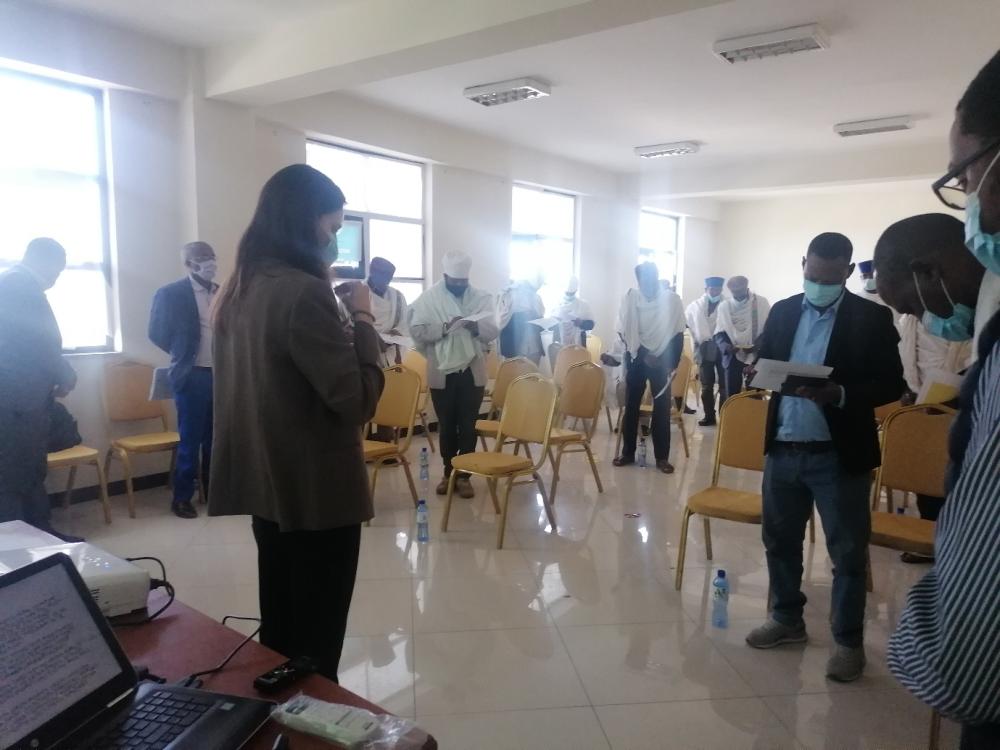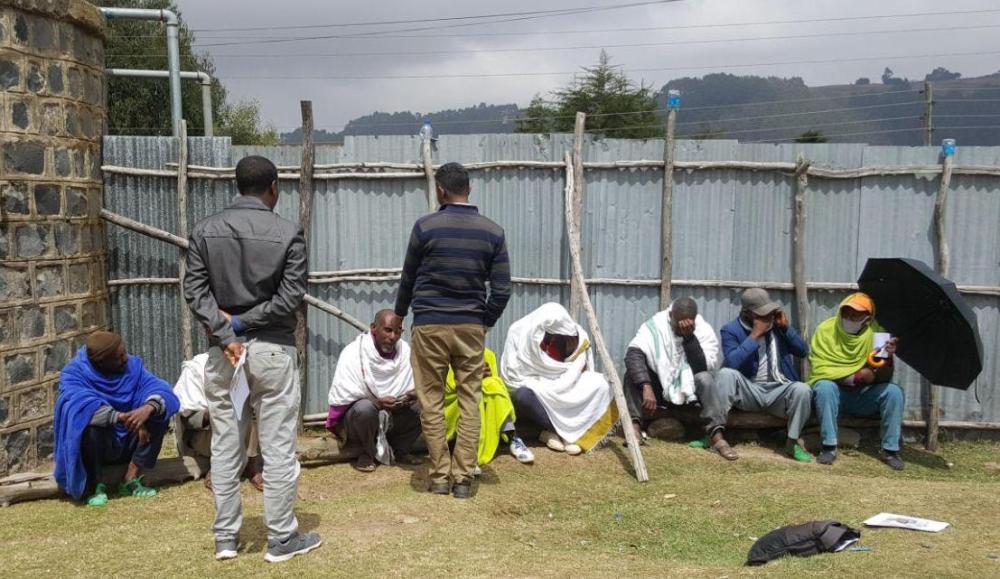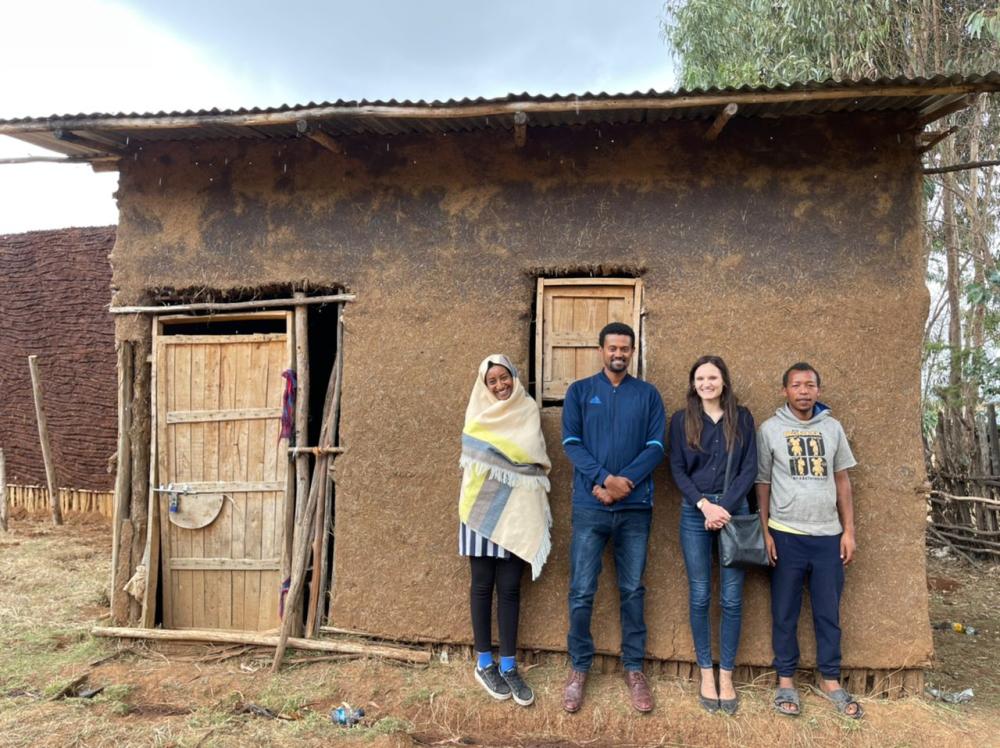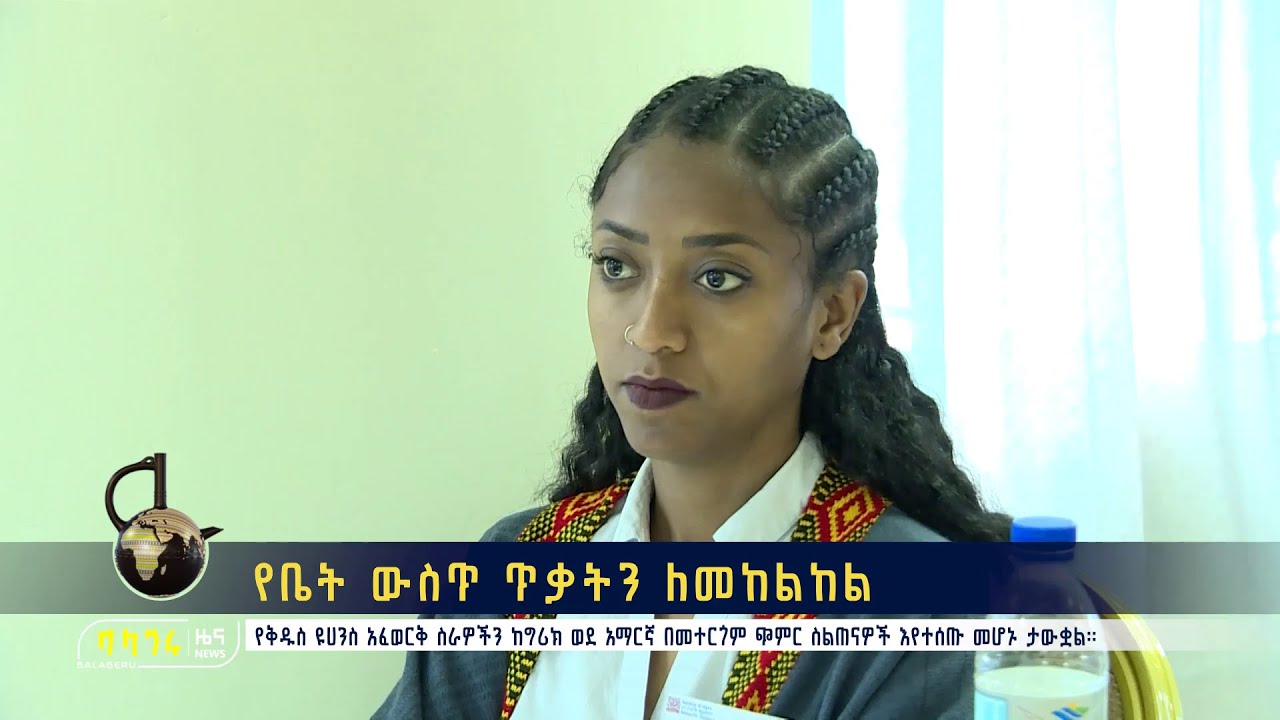Project dldl/ድልድል
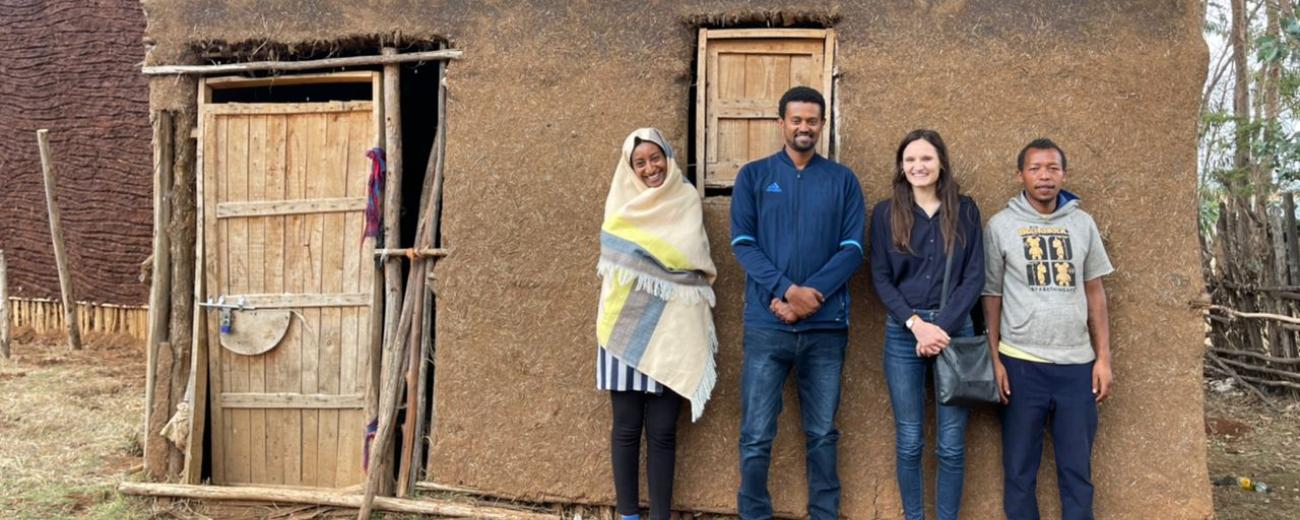

Promoting faith-sensitive, integrated and decolonial responses to domestic violence internationally.
Project background
In August 2020, Dr Romina Istratii, Honorary Research Associate to the Centre of World Christianity and the Department of Development Studies at SOAS, was awarded a UKRI Future Leaders Fellowship (£1,287,659) to bring to fruition a challenging and novel project titled “Bridging religious studies, gender & development and public health to address domestic violence: A novel approach for Ethiopia and the UK” (revised title), now renamed as Project dldl/ድልድል. This was envisioned as a research and innovation project dedicated to the development and strengthening of religio-culturally sensitive, domestic violence alleviation systems in East Africa and the UK.
The word dldl (spelt DLDL) means ‘bridge’ in Tigrigna, a term that reflects the project’s aim to bridge different disciplines, sectors and stakeholders in order to achieve a more reflexive, decolonial and integrated approach to addressing domestic violence in faith communities. The project works to generate new research and evidence on the ways in which religious beliefs, theology and the clergy can contribute to the deterrence of domestic violence, and to raise awareness about the religio-cultural parameters of domestic violence among practitioners within government and non-governmental sectors, with the overall objective of building better-integrated domestic violence support-systems.
The project built on Dr Istratii’s previous long-term ethnographic research with Ethiopian Orthodox Täwahәdo communities in Northern Ethiopia, which had showed both a prevalence of religious language in how the clergy and the laity understood and experienced domestic violence in rural and urban communities in the northern region of Tigray, and also the crucial role of the clergy in teaching about marriage and in mediating situations of conflict and abuse. While some clergy lacked the theological acumen to respond to marriage-related questions appropriately or the capacity to respond to victimised parties and perpetrators with consideration of the potential risks involved, others used theological language resourcefully and in ways that seemed to reverse rigid or pernicious attitudes associated with some forms of conjugal abuse or its implicit tolerance (a presentation of this research can be watched on the YouTube channel of Cambridge Centre for Christianity Worldwide).
At a more fundamental level, the project design and vision was informed by Dr Istratii’s lifelong work to de-westernise and de-secularise international development practice and promote responses to gender-related issues and domestic violence that are sensitive to the religious belief and knowledge systems of African communities. Dr Istratii has been especially keen to reverse the historical dominance of Northern societies in setting theoretical paradigms and in dictating domestic violence and gender-based violence theoretical understandings and practice internationally. The ultimate aim of the project is to promote genuine knowledge sharing and learning between Ethiopia and the UK, whereby evidence, lessons and good practices achieved in Ethiopia can inform ways to better integrate religious migrant and ethnic minority communities in the UK’s domestic violence support system.
The project was established on the basis of long-term working relationships with organisations and colleagues in Ethiopia, including with Aksum University, the St Frumentius Abba Selama Kessate Berhan Theological College, and the Ethiopian Women Lawyers Association, as well as new collaborations with Diversity Resource International, the University of Bristol and the University of Sheffield. Additional partnerships have been established since the start of the project with the Ethiopian Orthodox Church Development and Inter-Church Aid Commission (EOC-DICAC) and EMIRTA Research, Training and Development Centre in Ethiopia.
Starting the project during a pandemic and a war
In November 2022 the project completed its first two years, but the team had a rough start in 2020, having to navigate the COVID-19 outbreak and a war in Northern Ethiopia, where the project was intended to launch some of its activities. Soon after, Dr Istratii achieved to establish a new partnership with the Ethiopian Orthodox Church Development and Inter-Church Aid Commission (EOC-DICAC), transferring project activities to another region of Ethiopia not affected directly by conflict. In parallel, Dr Istratii and her team sought to inform humanitarian responses in Tigray, such as by conducting an extensive literature review to examine the relationship between IPV and conflict violence and to identify faith-sensitive responses to complex trauma in the conflict zone.
Despite the many challenges faced, the project has achieved numerous outputs and important outcomes that have promoted the overall aims of decolonising and diversifying responses to domestic violence internationally. Some of these outcomes are presented below briefly. The full list of outputs can be found on the website of the project, which is available in four languages.
Training 155 Ethiopian Orthodox Täwahәdo clergy
One of the major programmes completed by project dldl/ድልድል was a series of workshops with Ethiopian Orthodox clergy to build their preparedness to respond to domestic violence by means of imparting to them theological, psychological and safeguarding knowledge. The theological content was developed by Dr Istratii over many years of studying Patristic works and translating them with the support of theologians in Ethiopia. The workshops were designed to be culturally appropriate and were delivered in Amharic by Dr Istratii and two trainers, a certified psychologist and EOTC deacon, Mr Henok Hailu, and a practising attorney affiliated with EWLA, Ms Bezaweet Birhanu.
Over the period of a year, 155 members of the clergy were recruited and trained from the town of Debre Birhan and surroundings in Amhara region, Ethiopia. The project worked through established structures by entering in a collaboration with the Ethiopian Orthodox Täwahәdo Church Development and Inter-Church Aid Commission (EOTC DICAC), which acts as the development wing of the Ethiopian Orthodox Täwahәdo Church and has working relations with clergy training centres and diocese offices across Ethiopia. The workshop content development and delivery was also supported by the Ethiopian Women Lawyers’ Association (EWLA).
The evaluation of the pilot showed an overall positive response from the participants, including a strengthened conviction among the clergy that the workshop content and format they were exposed to enabled them to respond with more confidence to the problem of domestic violence and marital conflict issues in their community. Clergy asked for the trainings to be continued and to be extended to other groups, including priests’ wives and couples preparing for marriage. Following the completion of the pilot, an interfaith meeting was held with religious leaders from all other religious groups represented represented in the region and with the local government bodies supporting the project to explore how the pilot programme could be expanded to other communities.
Pictured: Starting the workshop with obtaining participants’ written consent, followed by a prayer led by a clergy participant.
Research on domestic violence with male participants using visual methods
Dr Istratii’s previous research in Northern Ethiopia had found that men who were not abusive cited a faith-based conscience as their deterrent factor, emphasising their desire to be moral and righteous and avoid sinning. Building on these findings, Project dldl/ድልድል completed new research to explore how a larger male sample rationalised domestic violence and abuse and how religious language and beliefs were invoked by men to rationalise (justify or condemn) domestic violence or to deter abusiveness. The research was also designed to serve as an intervention using interactive virtual methods to raise-awareness and to help the male participants envision possible deterrence mechanisms.
The research method combined a questionnaire with an series of visual scenario exercises that presented the participants with different situations described in previous research as harmful, and asked the men to describe them, consider if they agreed with the action or not, discuss the reasons behind the action and consider what they would do if they were in the protagonist’s position. The visual materials were prepared by Ethiopian artist Mr Yared Tadesse with close guidance from Dr Istratii.
This fieldwork itself was completed in collaboration with EMIRTA Research, Training and Development, an indigenous research organisation in Ethiopia. The field team comprised of four male researchers from EMIRTA, Dr Zinawork Assefa, Mr Tesfaye Gonite, Mr Yonas Habte and Mr Yohannes Demiss, with Dr Istratii guiding the team during research, data coding and analysis. Interactive surveys were completed with 72 male participants recruited from the areas surroundings of Debre Birhan in Amhara region, Ethiopia.
The research experience showed that the participants appreciated that they were invited to be part of research on domestic violence, since they had been excluded in the past, but found also useful the opportunity to place themselves in the position of the male protagonist and to associate their own lives to the situations depicted in the drawings. The process of describing the situations of domestic violence they were presented with led many men to share their own life’s stories, to realise their abusive actions and to regret them.
Pictured: EMIRTA researchers, Dr Zinawork Assefa and Mr Yohannes Demiss, during one of their fieldwork trips.
A podcast series
In 2021, Project dldl/ድልድል set up a podcast series (in Amharic and English) to engage the public in Ethiopia in the discussion on domestic violence and share resources and directions to overcome norms that maintain silence around the problem. All the episodes can be accessed on the Project dldl/ድልድል Soundcloud.
A film to raise awareness on the role of faith in domestic violence experiences
As part of project’s dldl/ድልድል impact pathways, Dr Istratii has collaborated in the past year with the UK-based company Exile Pictures to produce a multilingual docudrama on domestic violence in Ethiopia. The film’s storyline is a collation of stories and testimonies of real people as they were communicated to Dr Istratii in her previous anthropological research in Northern Ethiopia. The aim of the film is to share the research findings in a more accessible format with the public and other key stakeholder groups in Ethiopia to nuance current understandings about domestic violence and how this is experienced in reference to religio-cultural beliefs, practices and norms in Ethiopian rural society. The film is particularly interested in educating religious leaders, clergy and laypeople on the complex role that religious rationalisations and the clergy have in the experience of domestic violence in Ethiopia and to suggest how faith and religious leaders could become more resourceful and effective in responding to the problem.
Exile Pictures is led by Ms Hermon Hailay, who is Ethiopian, and Mr Max Conil, who has extensive experience and knowledge of filming in Ethiopia and the UK across a range of sensitive subject matters. Ms Hailay and Mr Conil are supported in Ethiopia by a local production crew led by Mr Yidnekachew Shumete, who is co-Founder and General Manager of the production company Kurat Pictures.
The production of the docudrama has been enabled by an innovative model of collaboration or co-production between Dr Istratii and the film producers. At an initial stage, Ms Hailay and Mr Conil guided Dr Istratii in the development of the film’s storyline and script, paying attention to the creative vision that Dr Istratii shared with the company. The script was written by Dr Istratii relying on first-person accounts and select passages from over 200 interviews with research participants. In the second stage, Dr Istratii has been working with Exile Pictures in the UK and Mr Shumete’s team in Ethiopia to move from pre-production to film production. Extensive discussions have been held about the ethics of producing a docudrama on the sensitive topic of domestic violence, the ethics around engaging real communities in this process, and security concerns in a currently conflict-affected Ethiopia to minimise risks for the production team.
Pictured: Dr Romina Istratii with Mr Yidnekachew Shumete and his team visiting potential shooting sites in rural Ethiopia
Annual hybrid international conference to promote integrated responses
The first two years of the project culminated in the Project dldl/ድልድል Annual Conference, which was organised physically in Addis Ababa, Ethiopia on 11-12 November 2022 with the option for UK speakers and audiences to join online. The Project dldl/ድልድል Annual Conference was co-organised with project partner EMIRTA/እምርታ Research, Training and Development Institute and brought together religious, secular, government and non-governmental stakeholders working to address domestic violence in Ethiopia and internationally to facilitate the communication of new evidence and to promote cross-disciplinary and cross-sectoral knowledge exchange and new collaborations.
The conference featured numerous panels with presenters from different parts of Ethiopia and internationally, and a series of workshops delivered by international specialists from the UK, USA, Kenya and other countries. It culminated in a livestreamed roundtable discussion which brought prominent feminist and religious organisations, government officials and international specialists to explore a better integration pathway for religious, feminist and state resources to respond to domestic violence in Ethiopia and internationally.
Watch Dr Romina Istratii being interviewed in Amharic by Ethiopian media news channel Balageru during the conference:
Current activities
Currently the project is working to launch its UK activities, which will explore the extent and ways in which religious sensitivity is addressed and integrated in domestic violence services supporting ethnically diverse communities in the UK and how to achieve a better integration of community resources and religious stakeholders in mainstream domestic violence services. Dr Istratii will be working closely with Professor Gene Feder at the University of Bristol and Professor Parveen Ali at Sheffield University to produce a sector-wide survey, complemented by community-based research with migrant and ethnic minority communities. The research activities in the UK will also be facilitated by Dr Linda Mshweshwe, a new postdoctoral researcher that recently joined the project.
Further infomation
If have questions or would like to reach the project team, please email the Principal Investigator at ri5@soas.ac.uk or the project’s dedicated email at soasflf@soas.ac.uk.
Principal Investigator: Dr Romina Istratii
Other SOAS staff involved: Estela Papagianni (Project Manager since Nov 2020), Dr Linda Mshweshwe (Postdoctoral Researcher since Nov 2022)
Project duration: 2020-2024 with possible extension to 2027
Learn more
- projectdldl.org (the website is available in English, Amharic, Tigrigna and Afaan Oromo languages)
- Vimeo
- Soundcloud
